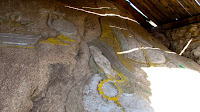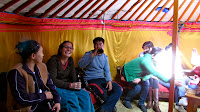 |
| At Chinggis Khaan's Memorial |
 A couple weekends ago, I went on a trip to Manzushir Khiid with the teachers from my school. We planned to leave from the school at 7 a.m., so of course we left around 8:30. It was a very cold day, and I dressed appropriately in three pairs of pants and three tops and a jacket. I even brought along my hat and gloves. My teachers also dressed warmly, but had a better idea of how to beat the cold. About thirty minutes into our meeker (microbus) ride there, the first bottle of vodka was opened and passed around in shot form, along with watermelon halves that had just been sliced in the car with a pocket knife. I’d like to inform you that at this point in the trip, we were off the main road and barreling down dusty, mountainous trails. What better time for a watermelon and shot fiesta?
A couple weekends ago, I went on a trip to Manzushir Khiid with the teachers from my school. We planned to leave from the school at 7 a.m., so of course we left around 8:30. It was a very cold day, and I dressed appropriately in three pairs of pants and three tops and a jacket. I even brought along my hat and gloves. My teachers also dressed warmly, but had a better idea of how to beat the cold. About thirty minutes into our meeker (microbus) ride there, the first bottle of vodka was opened and passed around in shot form, along with watermelon halves that had just been sliced in the car with a pocket knife. I’d like to inform you that at this point in the trip, we were off the main road and barreling down dusty, mountainous trails. What better time for a watermelon and shot fiesta? |
| Preparing the khorkhug |
 |
| Pouring airag (fermented mare's milk) |
 |
| Outside of our ger |

When we arrived at Khiid, we secured a ger for the day. Once inside, my male teachers, Batsukh, Altansukh, and Battogtokh began to make a fire while the female teachers organized a vast array of food on the only table. Once the fire was going, the men balanced a khorkhug container atop the wood-burning stove. Khorkhug is probably one of my favorite Mongolian delicacies, and it consists of a goat or sheep whose parts have been pressure-cooked in a giant metal milk jug-like container with water, potatoes, and carrots. I find the flavor and texture of the meat cooked in this style to be reminiscent of a nice roast. The khorkhug cooked as we munched down on ham, pickles, pickled salad, boov (small pastry-like bread nuggets), and homemade jam from mountain berries (which phenomenally tastes like blackberry jam and which I hope to bake with at some point, should I ever find an available oven).



After our khorkhug feast, we explored the grounds of Manzushir, a monestary that remains today in rubble after it was torn down in the 1930’s by the Soviets. We went to a museum full of taxidermied animals and then began our hike up one of the mountains surrounding the remains. The scenery at Manzushir is indescribable, and I’ve been assured that it is even more beautiful in the summertime. We climbed to the first of three protected overlooks that was built to protect very old carvings in the mountain. When standing on the small ledge in front of the carvings, one became aware of just how steep the trek was up the mountain, for the overlook rested on a bald-faced edge
among scattered rocks that had surely fallen from up above. In the second over-hang, we stopped to all simultaneously shout across the vastness which lay before us. Our combined voices carried over the rubble and through the valley on the other side. When we finished our unison yelling, one of my counterparts looked over at me and asked, “Could you feel the energy?” Her simple question summed up what that moment of yelling was: all of us throwing our voices across the scenery to see how far we could make it together, and ultimately, to be reminded of how small we stood amongst the mountains when the voices stopped and were engulfed by the sound of the wind.
 The third overlook rested beside a tree covered in khadug, a traditional scarf (typically blue) which plays an important role in Mongolian culture. Adapted from Tibet, the bright blue of the scarf symbolizes the expansive Mongolian sky, and the giving of a khadug symbolizes compassion and purity of intentions. For example, when a man proposed to a woman, he will give a khadug to her father. Likewise, when I arrived in Mongolia, I was presented one for well wishes and the start of a good relationship. I was told that the tree dressed in these colorful scarves was a “wish tree,” and observed one by one as each of my counterparts and friends whispered their hopes among the branches.
The third overlook rested beside a tree covered in khadug, a traditional scarf (typically blue) which plays an important role in Mongolian culture. Adapted from Tibet, the bright blue of the scarf symbolizes the expansive Mongolian sky, and the giving of a khadug symbolizes compassion and purity of intentions. For example, when a man proposed to a woman, he will give a khadug to her father. Likewise, when I arrived in Mongolia, I was presented one for well wishes and the start of a good relationship. I was told that the tree dressed in these colorful scarves was a “wish tree,” and observed one by one as each of my counterparts and friends whispered their hopes among the branches.Our climb down was only slightly less than terrifying. The steep face and numerous pebbles made finding secure footing difficult, but we all made it down just fine. Once back on the ground, we returned to our ger to rest for a bit and sing some songs. At around 6 p.m., I was invited over to the school management’s ger with the rest of our faculty for an “opening ceremony.” Confused at why the “opening ceremony” was happening so late in the day when I was already exhausted was beyond me, but I went anyway. Once there, the teachers from my school formed a huge circle and sang the Mongolian version of “If You’re Happy and You Know It.” Friends were laughing and dancing and vodka was being toasted. From the ceremony, we headed back to the ger to warm up before heading home. As predicted, this warming-up consisted of more drinking and singing.
 |
| All the teachers at "Opening Ceremony" |
 |
| The Foreign Language Dept. |
As the night ended, we headed back to our meeker. An impromptu dance party broke out after I had taken a seat inside, and my teachers came to drag me from the car to join in the middle-of-the-path get down. Finally, it was time to leave. I cannot quantify how long we were on the road on the way home. The trip was dark and disorienting, and the “road” was as bumpy as I remember it on our trip in. The only number I can measure this trip in is the three bottles of vodka we stopped separately to buy on our return home. Yes, three. In the meeker. On the dark, dark road. My counterparts spent the entire ride (I mean the entire ride) singing songs. At one point, a competition was held between the front half of the meeker and the back to see who could sing the most songs without repeating any. About 4 hours later when we arrived home, no song had been repeated, and the teachers began a tune about Baganuur (my town) which I could not have been more happy to hear. I was dropped off at nearly 1 a.m. right beside my apartment. The short walk home was bitter cold, but I couldn’t have been happier to see my warm bed.



Amazing! Makes me wish I was right there with you. I didn't want you to go to Mongolia. After reading your accounts of what a wonderful place it is,all that you are learning, how you appreciate each experience, noticing and appreciating even the small things that we all take for granted, makes me so proud of you and glad you have had this opportunity. I think when you come home we are going to see a much wiser and changed Sara. Mammaw loves you, my heap little big mouth.
ReplyDelete